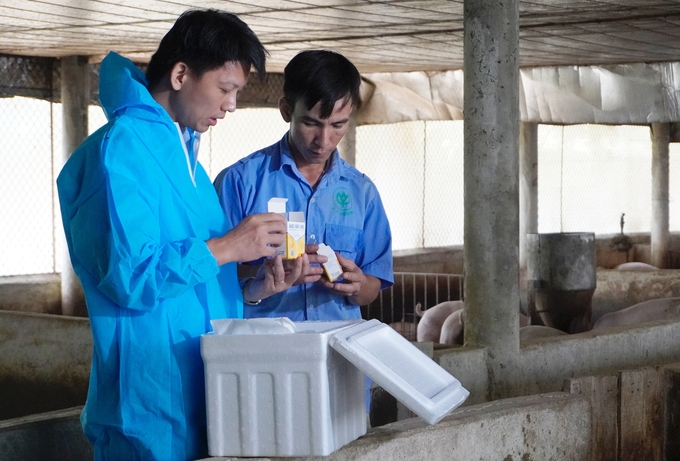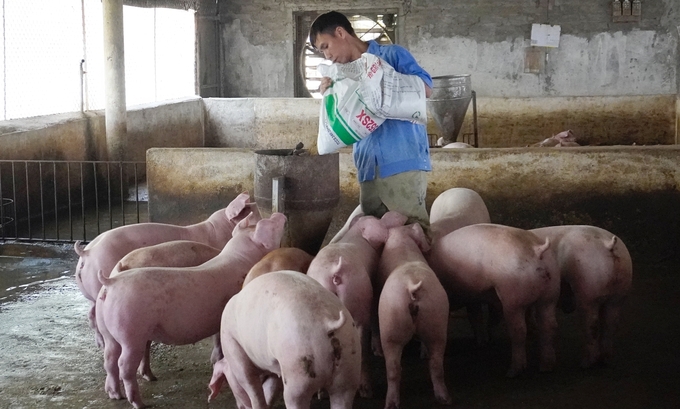May 23, 2025 | 01:59 GMT +7
May 23, 2025 | 01:59 GMT +7
Hotline: 0913.378.918
May 23, 2025 | 01:59 GMT +7
Hotline: 0913.378.918

Nguyen Van Diep, CEO of AVAC Vietnam Joint Stock Company, and Pham Trung Hieu, a pig farmer from Ha Thach Commune, Phu Tho Town, Phu Tho Province, sharing insights into the AVAC ASF LIVE vaccine. Photo: Hong Tham.
Pham Trung Hieu, a farmer from Ha Thach Commune, Phu Tho Town, Phu Tho Province, embodies the local community's resolve to protect their pig populations from the African swine fever (ASF).
At present, Hieu's farm houses 35 sows and 300 meat pigs. Additionally, his farm is a feed distributor for C.P. Vietnam and other local pig farmers. Notably, Hieu has vaccinated his entire herd with AVAC ASF LIVE, a vaccine for the African Swine Fever, produced by AVAC Vietnam Joint Stock Company.
Hieu conducted thorough research through various media channels and learned that AVAC had successfully developed an ASF vaccine, with tested and verified results at several farms in Hung Yen Province. After receiving assurances on the vaccine's safety and efficacy from technical staff at various livestock companies, Hieu decided to pioneer the use of the product in his hometown.
Hieu administered the first round of vaccinations to 80 meat pigs and 7 sows in July 2024. Subsequently, his meat pigs exhibited healthy growth, with the first 20 successfully sold. Hieu is currently rearing the remaining pigs with expectations to sell his herd by the end of October 2024.
The vaccine's positive results encouraged Hieu to proceed with a second round of vaccinations in August 2024 for 30 sows, 2 boars, and 170 meat pigs. Similarly, both the sows and boars have exhibited excellent post-vaccination behavior, with normal reproductive cycles. Additionally, piglets born to vaccinated sows are also healthy, with no unusual issues reported.
To date, Hieu’s family has fully integrated AVAC ASF LIVE and the corresponding vaccination regimen into their farm practices. Accordingly, Hieu vaccinates newborn piglets along with the sows at approximately 23 to 28 days post-birth. He also administers other vaccines without changes.
Regarding the decision to take the initiative and vaccinate his entire herd against ASF, particularly the sows—despite the lack of formal recommendations for this group of livestock—Hieu explained, “Under extreme pressure from disease outbreaks, I realized that without taking the bold step to try the ASF vaccine, there was no other way to protect my herd. This was the most feasible solution, the only new path forward that allows small-scale farmers like us to continue in this industry. Without it, we would have no other option but to stop.”

Pham Trung Hieu is expecting the official adoption of the AVAC ASF LIVE vaccine for sows, which will allow small- and medium-sized pig farms to strengthen their disease prevention efforts. Photo: Hong Tham.
Hieu’s family has participated in the pig farming industry since 2002, accumulating over 22 years of experience. Notably, his farm has faced two African Swine Fever outbreaks. The first outbreak in 2019 resulted in the death of 15 sows, leaving only the meat pigs unaffected. A second wave in September 2023 left more substantial damages, reducing his herd of 35 sows to just 6 survivors. Additionally, 140 nursing and newly weaned piglets, along with 50 meat pigs, were killed.
Hieu recalled that, despite attempting to quickly sell off their herds or mortgage assets during the outbreaks, his neighbors failed to save their pigs. The mass losses completely devastated the farmers due to a lack of vaccine against the African Swine Fever at the time.
“I was extremely worried about my family’s future after experiencing two disease outbreaks,” he shared. “I also wondered if it was time to give up pig farming.”
For Hieu, disease outbreaks are one of the most significant challenges for small-scale pig farms, especially with the rapid spread and high mortality rate of the African Swine Fever. He believes that vaccination is the only effective solution to protect local pig herds.
“If funds are low, you can take a loan from the bank. Market prices may fluctuate, but if the pigs die, farmers can lose everything,” Hieu emphasized. “Vaccination, particularly against ASF, is the only way for small farmers like us to protect our herds and weather the hardships caused by disease.”
Translated by Nguyen Hai Long
![Reducing emissions from rice fields: [2] Farmers’ commitment to the soil](https://t.ex-cdn.com/nongnghiepmoitruong.vn/608w/files/news/2025/05/05/dsc08881jpg-nongnghiep-140632.jpg)
(VAN) Clean rice cultivation model in Thuong Tan commune, Bac Tan Uyen district, is assisting local residents in achieving sustainable agriculture by substantially reducing costs, increasing productivity, and protecting the environment.

(VAN) At the conference to disseminate Resolution No. 68, AgriS introduced its digital agricultural ecosystem and reaffirmed its commitment to accompanying the Government in promoting private sector development and sustainable agriculture.

(VAN) 'Blue Ocean - Blue Foods' initiative is designed to restore marine ecosystems and establish sustainable livelihoods for local communities by cultivating a minimum of 1,000 hectares of cottonii seaweed in the first three years.
/2025/05/21/4642-3-112707_603.jpg)
(VAN) The V-SCOPE project has made direct contributions to three out of six pillars of the Comprehensive Strategic Partnership between Vietnam and Australia.

(VAN) Facing the threat of rabies spreading to the community, Gia Lai province urgently carries out measures to vaccinate dogs and cats on a large scale.

(VAN) Disease-free livestock farming not only protects livestock herds but also stabilizes production and livelihoods for many farmers in Tuyen Quang.

(VAN) Japan's grant aid project contributes to capacity building, promoting organic agricultural production, and fostering sustainable community development in Dong Thap province.